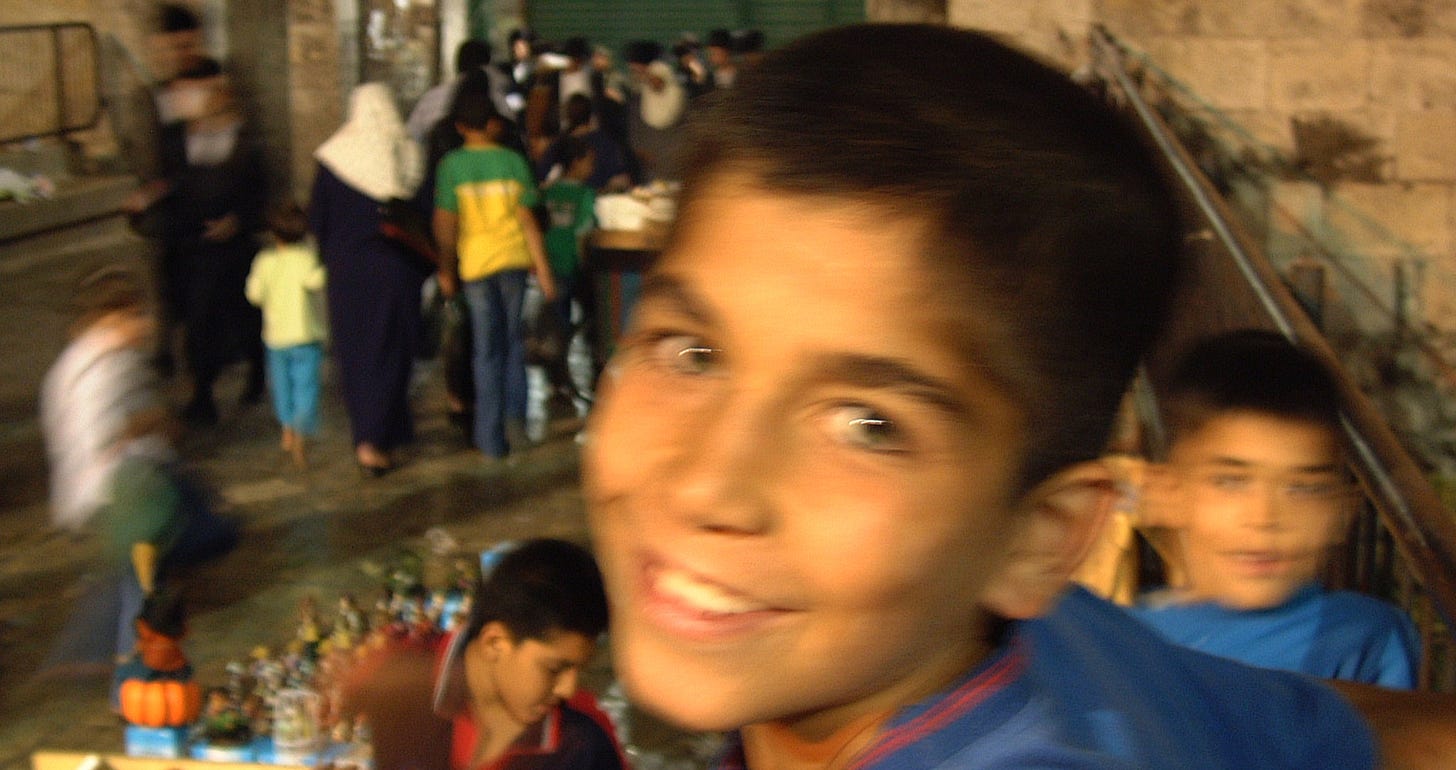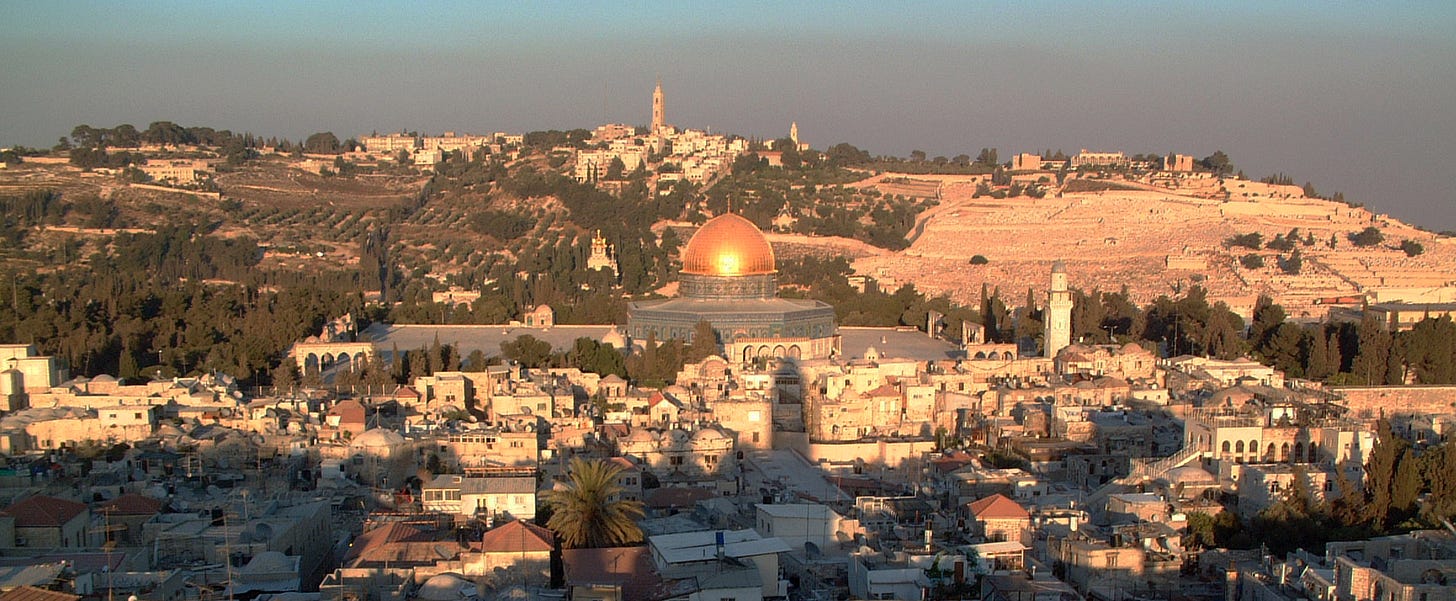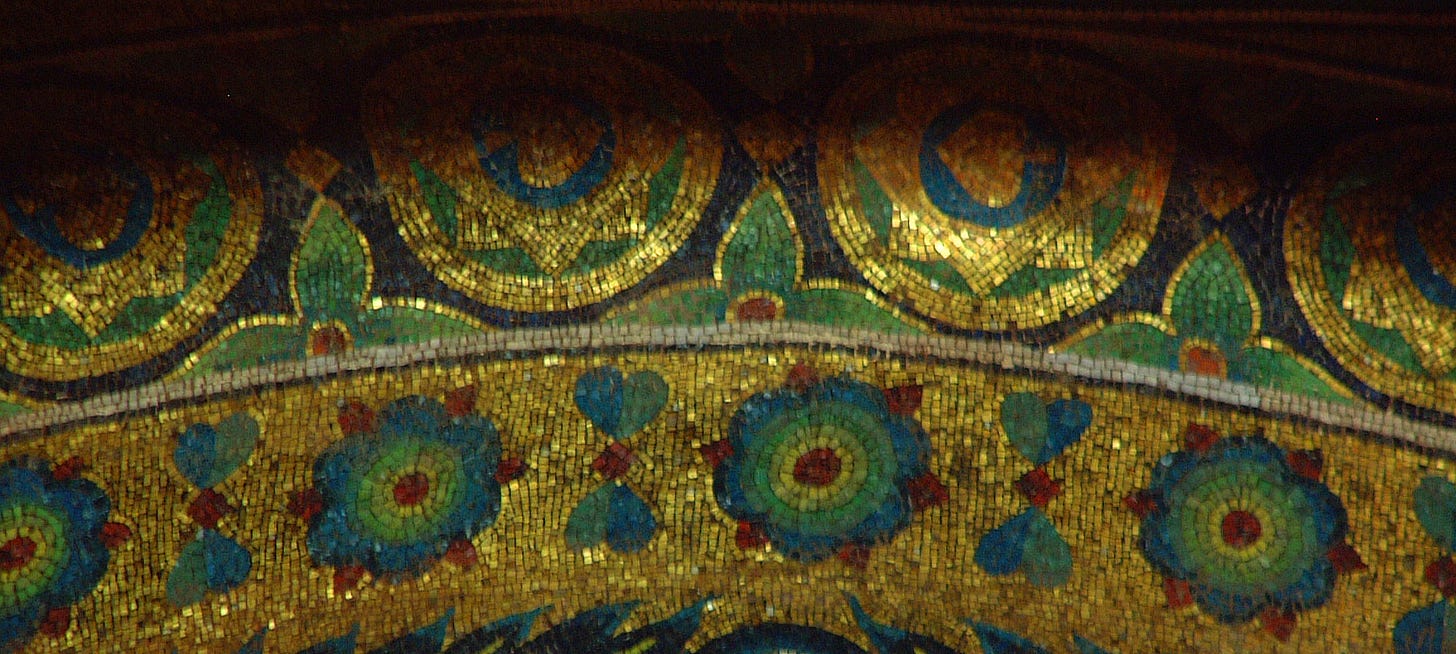1966 Canadian psychiatrist Vivian Rakoff notes that he is seeing large numbers of adolescent offspring from Holocaust survivors. “It is almost as if their parents, in an attempt to justify their survival, demanded qualities of their children which were the accumulation of their expectations of all the dead who were murdered."
I have visited Jerusalem three times, first in 2003, last in 2010. The events here come from 2006. I am wandering around Jerusalem, talking to anyone who will engage, as well as interviewing some contacts. The experience reminds me of travelling in parts of Eastern Europe after the Berlin Wall came down. There's an urge to testify, to share, and to mark one's own place in the whirlwind.
In the Garden of Gethsemane the caretaker is struggling with a group of visitors from Goa. They are picking the olives. Some of the trees are extremely ancient, possibly even old enough to have been there when Jesus visited. The Indian Christians are unabashed. They want their holy relics.
I head off uphill on to the Mount of Olives where thousands are buried, including I notice, Robert Maxwell, the disgraced businessman who fell off his yacht and drowned in 1991. I had forgotten that Maxwell was Jewish, born in poverty in what is now Ukraine, his parents later dying in Auschwitz. He went on to be a war hero, single-handedly storming a German machine gun post, then a phenomenally successful publisher in England.
At his glorious peak, however, came a significant setback. His attempt to buy the Sunday tabloid newspaper, News of the World, failed. The owners refused to sell to a mere immigrant. There were hints of anti-semitism and a front page op-ed that described the paper as "British as roast beef and Yorkshire pudding." It was then sold to an Australian, Rupert Murdoch. Maxwell, you might say, had flown too close to the sun. And eventually, down he came, leaving behind all kinds of tangles, and a daughter, Ghislaine.
In a cafe near the Garden of Gethsemane, I meet Khaled who tells me he held a senior position in the management of the Dome of the Rock during the 1980s. "It is God's will," he tells me, "That the Jews are here." And he doesn't mind. "I don't like these Palestinian politicians - I'd rather be ruled by my enemy."
His family came to Jerusalem 1,400 years ago, and 30 generations have their names inscribed in the Dome of the Rock. "The Hebronites and Jews started coming here at the start of the 20th century. Two invasions! They were all poor people. Actually, I should say it was migration, not an invasion. But now they are all-powerful. We are losing everything to the settlers: land, power, money," he shrugs, "And that is God's will."
I'm intrigued to know who the Hebronites are. The answer is simple. People from Hebron. Palestinians. As so often happens in Jerusalem, a new complexity is added to what is already intricate.
Khaled is an old Jerusalemite and laments the passing of the grand aristocracy of ancient families: Arab, Christian, Jewish - he doesn't mind their religious affiliations, what counts is the number of generations spent inside the intricate woven network that is Jerusalem society.
We drink tea. He starts a diatribe. "Who invented chemical weapons and nuclear bombs? Anglo-Saxons. Who is destroying nature? America. But humans will not destroy the world," he says, "God will do that. One day for God is a thousand years for man." His conversation charges off, like a muslim Don Quixote, tilting at various windmills.
I'm getting used to a particular kind of conversation. I'm scribbling while people talk, but sometimes it is just too incoherent and fast to keep up. Then I make a mark in my notebook, TB, 'talks bollocks', even occasionally preferring the more extreme TUB, 'talks utter bollocks'. But I don't contradict, or challenge anyone. I just let them run and see what comes out. I write down what I can. Khaled's rant ends when a friend walks into the cafe and they shout at each other, "Hey, asshole!" They laugh uproariously and greet affectionately.
Jerusalem is a constant reminder that no one is all good, or all bad, and that we are all flawed, some more than others, perhaps.
Back in the town after sunset, the shops are closing and people hurrying home. Palestinian vegetable-sellers hoist their empty crates on their heads and set off. I meet a priest, Father Massimo, who came here from Bologna 22years ago. "Just being near the holy places gives me the strength to live here - it's not so easy."
We walk to his home, the Monastery of the Flagellation, where he studies Biblical languages and the texts. Upstairs there is a lounge where a single old friar is sitting. He is wearing a baseball cap. Father Massimo specialises in Aramaic and Syriac. We talk about paradise, the word itself.
"In late Assyrian you have pardisu meaning fruit trees or costly plants and we find that sense in the Song of Solomon chapter 4, Nehemiah 2 and Ecclesiates 2. There are three mentions of paradise in the Old Testament, all meaning a beautiful garden. By the time of the New Testament, however, it seems to be changed in meaning, to perfection. Do you want to try any of these biscuits? They're very good."
Next day I head out to Yad Vashem, the Holocaust Memorial.
In front of one photograph, a woman asks me in Hebrew to borrow a pen. Dalia has come here to try and find the names of relatives who died in the death camps. They were Ukrainian Jews. "My grandparents who survived never ever spoke about it. Nothing."
Now she has found a name on a list and tears are rolling down her cheeks as she writes. The museum is a harrowing experience for anyone, but for Dalia it is truly traumatic. She cannot stop crying, pulling me to see the details of photos and artefacts. "Look at this." It's a notebook that was found among a pile of things at a death camp: a notebook in which the owner had been practising Arabic and Hebrew writing. "See? They were learning for the Middle East."
At the terrible model of the Birkenau gas chambers, she stares for a long time. "Did you know that Jewish scientists worked on developing poison gas during World War One?"
She has come with a group, but she shows no sign of wanting to be with them. She is different, I realise, a bit wild and prophet-like. At a display about a death camp, the glass front is being cleaned, she nudges me. "All the cleaners are Arabs. They serve in the cafeteria. Do you know that Gaza is a ghetto?"
At the pile of shoes, genuine shoes from victims who undressed to enter the gas chambers, she weeps again, gasping, "I can't take this. I need something good."
In the car park afterwards, she is distraught, almost crazed. "I don't know which coach is mine and I don't care. Isn't Sharon aware that he is doing to the Arabs what was done to us Jews?"
She is walking up and down, delivering unconnected and random utterances. "Is anyone a better person for more than three minutes after visiting that museum?"
"I must not be relativistic. I have to remember that."
"Which colour, which company?"
"If they sounded a fire alarm, how would we behave?"
Then she stops. "But I did get something beautiful. Did you see it? There was a man who painted in Terezin death camp, painted lovely scenes for his son, pictures of innocence and hope - in that place where 7,000 children died. I have his name - thanks to your pen. I could have stolen the Visitors Book pen, but you had one."
Then she looks up. Someone is shouting her name. A coach that was leaving has stopped and someone is waving from the open door. She shakes my hand, then runs for it, crying again.
It takes time and effort. Your contribution will help…






